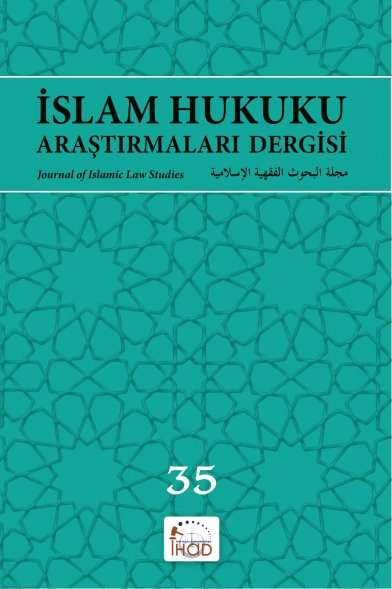Kadı Şüreyh ve Fıkıh Anlayışı
Fıkıh ilimlerinin teşekkül sürecinde tabiin döneminde yaşanan gelişmeler henüz çağdaş fıkıh tarihi çalışmalarında yeterince ele alınmamıştır. Bu dönemde yaşamış ictihad ehli fakih/kadıların yorum ve ictihadlarının sonraki dönemde oluşan mezheplere tesiri ve bu tesirin boyutunu ortaya çıkarmak, özellikle hicri birinci yüzyılda fıkhın gelişmesi bağlamında ortaya konan çabayı daha iyi anlamak bakımından önem arz etmektedir. Bu çalışmada İslam’ın erken dönemlerinde, Hz. Ömer’in hilafetinden Emevi devletine kadar en önemli merkezlerden biri olan Kûfe’de yaklaşık altmış yıl boyunca kadılık yapan tabiin döneminin meşhur fakih ve kadılarından Şüreyh b. Hâris’in fıkıh anlayışı incelenmiştir. Kadı Şüreyh kendinden önceki ilmi birikimi sonraki nesillere aktarmakla birlikte kazai ictihadlarıyla meşhur olmuş bir kadı/fakihtir. Makalemizin amacı Kadı Şüreyh’in fıkıh düşüncesinin ana hatlarını ve bu düşünceyi temellendiren kaynakları ortaya çıkarmaktır. Genel anlamda Kadı Şüreyh Kûfe ekolünün nas ve akıl dengesini gözeten ehl-i rey mezhebine mensup bir fakih sayılır. Bu sebeple Hanefî mezhebi Şüreyh’in görüşlerine değer vermiş ve Şeybânî’nin el-Asl’ı gibi ilk kaynaklarda kendisine birçok yerde atıfta bulunulmuştur. Ancak onun görüş ve kararları sadece Hanefîleri değil diğer fıkıh mezheplerini de etkilemiş ve genel anlamda fakihler tarafından saygı ve takdir görmüştür. İlk dönemin parlak fakih ve kadılarından biri olan Şüreyh’in görüşleri günümüze değin etkisini koruduğu gibi gerektiğinde istifade edilecek bir kaynak olarak değerini muhafaza etmektedir.
Anahtar Kelimeler:
Kadı Şüreyh, Kûfe, Hanefilik, Kaza, Kadı, Fıkıh tarihi
Shurayh al-Qadhi and His Understanding of Fiqh
Developments in tabiin period during the formation of fiqh sciences have not been adequately addressed in contemporary fiqh history studies. It is important to reveal the effect of the interpretations and ijtihads of the jurists / judges who lived in this period on the schools formed in the following periods and the extent of this influence, especially in order to better understand the effort made in the context of the development of fiqh in the first Hijri century. In this study, in the early periods of Islam, Shurayh b. Harith’s understanding of fiqh has been examined. He was one of the famous jurists and judges of tabiin period. For about sixty years he was a judge in Kufa, which was one of the most important centers since the time of the caliphate of Umar to the Umayyad state. Shurayh is a judge / jurist who became famous for his judicial ijtihads, also he passed on the scientific knowledge before him to the next generations. The aim of this article is to reveal the outline of Shurayh’s thought of fiqh and the sources that based this thought. In general, Shurayh is considered a jurist who is a member of Ahl-i Ra’y school of Kufa. For this reason, the Hanafi school valued the views of Shurayh and he was referred to in many places in the first sources such as Shaybani’s al-Asl. However, his views and decisions influenced not only Hanafis but also other fiqh schools and were generally respected and appreciated by the jurists. The views of Shurayh, one of the brilliant jurists and judges of the first period, have preserved their influence until today and preserve its value as a resource to be used when necessary.
Keywords:
Shurayh al-Qadhi, Kufa, Hanafi school, Judiciary, Muslim Judges, Fiqh History,
- ISSN: 1304-1045
- Yayın Aralığı: Yılda 2 Sayı
- Başlangıç: 2004
- Yayıncı: Gençleri Evlendirme ve Mehir Vakfı
Sayıdaki Diğer Makaleler
İslam İdare Hukukunda Yöneticinin Halk Tarafından Denetimi
Mâlikî Fakihi İbnü’l-Kassâr’ın Hayatı, Eserleri ve Usûl Görüşleri
Kıyas İşleminde İllet Birliğinin Sağlanamaması Hali: Kıyâs Ma‘a’l-Fârık
Mekke’de Bir Osmanlı Fakihi: Yazma Nüshalara Göre Pîrîzâde İbrahim’in Hayatı, Şahsiyeti ve Eserleri
